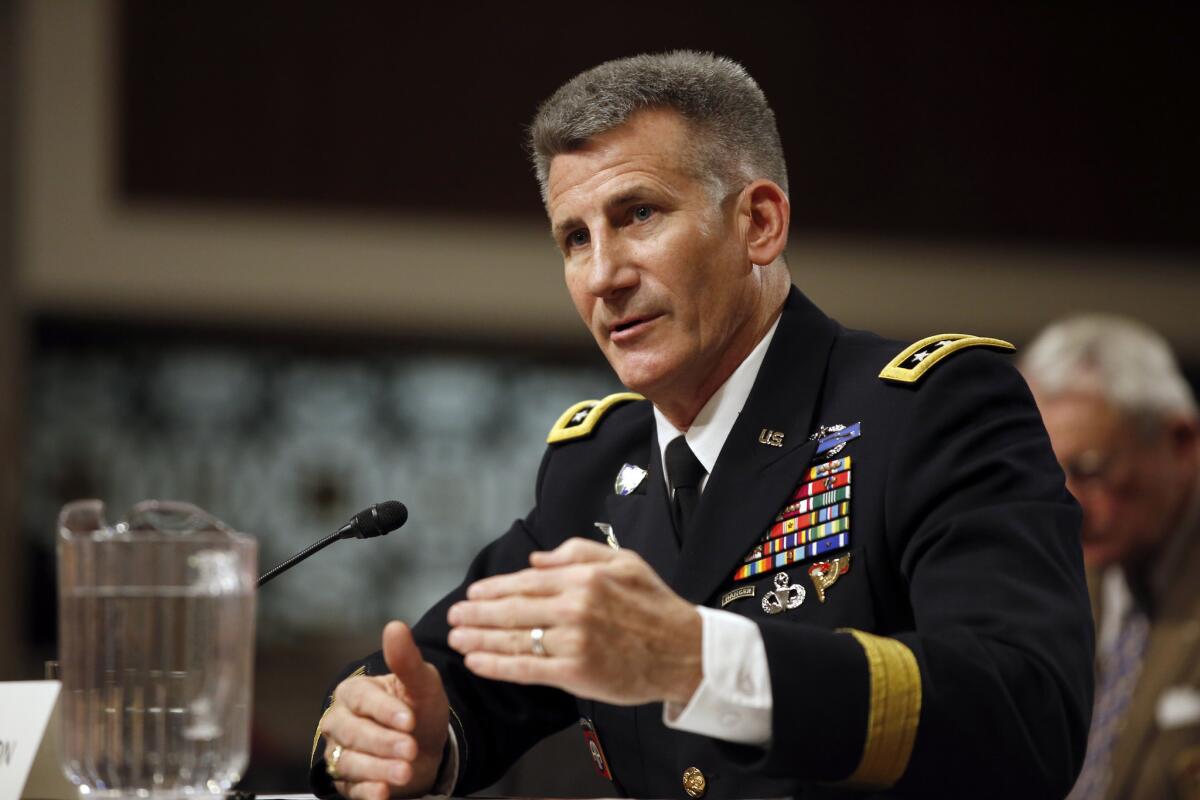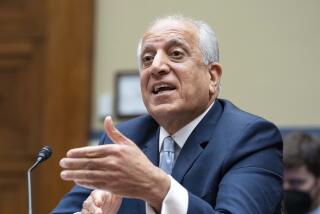A new U.S. commander takes over a deteriorating Afghanistan war

Gen. John W. “Mick” Nicholson testifies on Capitol Hill in Washington in January.
reporting from Kabul, Afghanistan — A new commander took charge of the U.S.-led military coalition in Afghanistan on Wednesday as a deadly suicide bombing illustrated the challenges he confronts in a conflict now in its 15th year.
Gen. John W. “Mick” Nicholson took over from Gen. John F. Campbell during a ceremony at NATO coalition headquarters in Kabul at a moment when insurgents control more territory in Afghanistan than at any time since the 2001 U.S.-led invasion.
Nicholson, 58, praised Afghan and international forces for continuing the fight against antigovernment militants, who now include not only the Taliban but also fighters claiming allegiance to Syria- and Iraq-based Islamic State.
See the most-read stories this hour >>
“I believe that all who have fought bravely within the Afghan security forces and the coalition are heroes,” Nicholson said.
“But the real heroes of this conflict are the Afghan people – those Afghan leaders here in the capital who take on the tough job of creating and running a government, and those in the villages and towns of Afghanistan whose lives have indeed been improved in the years since 2001, but who also have had to face the uncertainty and losses involved in this conflict.”
Civilian casualties rose in 2015 to their highest levels in recent years, according to United Nations statistics, as insurgents stretched the Afghan security forces and brought violence into areas once considered safe.
On Wednesday, a suicide attack in the eastern city of Jalalabad left at least three people dead and 19 injured.
Officials said a suicide bomber detonated his explosives near the gates of the Indian consulate, which is located next to several other foreign diplomatic missions. Then four gunmen began a half-hour battle with Afghan security forces, who ultimately killed the attackers, officials said.
See more of our top stories on Facebook >>
At least two civilians and a police officer were killed. No group immediately claimed responsibility for the attack.
Campbell oversaw the drawdown of coalition forces and the transition to an advisory role in support of Afghan forces in December 2014, only to see U.S. special operations forces and warplanes drawn back into the conflict after Taliban insurgents waged major offensives in the north and south in recent months.
Nicholson, who begins his fourth tour in Afghanistan, leads a force of 13,000 international troops from more than 40 countries, including 9,800 Americans.
Addressing his comments to insurgents, Nicholson said: “I know you. You have brought only hardship and suffering to the Afghan people.”
But he also is left to deal with the repercussions of two deadly incidents that involved international forces.
Last fall, U.S. forces bombed a hospital run by the medical charity Doctors Without Borders in the northern city of Kunduz, leaving 42 people dead and more than 30 injured.
More recently, international forces were implicated in a raid on a hospital run by the Swedish Committee for Afghanistan, an aid agency, in the eastern province of Maidan Wardak. The aid group said that Afghan and international troops entered its hospital last month, forced two patients and a 15-year-old relative out of the hospital and shot all three dead.
NATO officials said they were aware of the allegations and had begun an investigation.
Latifi is a special correspondent.
ALSO
Refugees buying one-way tickets home after finding Germany intolerable
What can President Hassan Rouhani’s pro-reform coalition achieve in Iran?
Controversial student activists turn India’s universities into ideological battlegrounds
More to Read
Sign up for Essential California
The most important California stories and recommendations in your inbox every morning.
You may occasionally receive promotional content from the Los Angeles Times.










